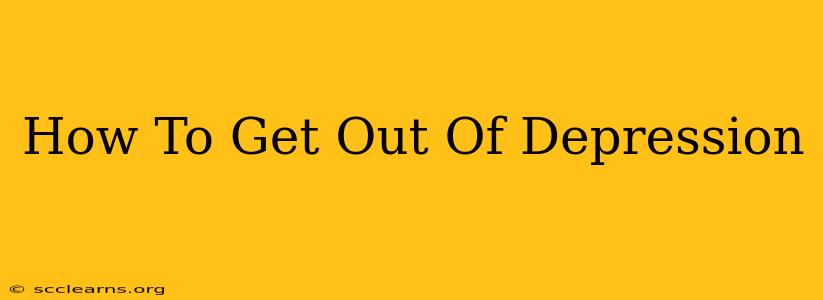Depression is a debilitating illness affecting millions worldwide. It's crucial to understand that you're not alone and that recovery is possible. This guide offers practical steps and resources to help you navigate your path out of depression and towards a brighter future. Remember, seeking professional help is a sign of strength, not weakness.
Understanding Your Depression
Before exploring solutions, it's important to understand the nature of your depression. Is it situational, stemming from a specific event or ongoing stressor? Or is it persistent and seemingly unrelated to external factors? Identifying the root cause can help tailor your recovery plan. Consider keeping a journal to track your moods, triggers, and potential patterns.
Recognizing the Symptoms
Depression manifests differently in everyone, but common symptoms include:
- Persistent sadness or low mood: A feeling of emptiness or hopelessness that lingers for extended periods.
- Loss of interest or pleasure: Apathy towards activities once enjoyed, including hobbies, social interactions, and even basic self-care.
- Changes in appetite or sleep: Significant weight loss or gain, insomnia, or excessive sleeping.
- Fatigue or loss of energy: Feeling constantly tired and lacking motivation.
- Restlessness or irritability: Feeling agitated, on edge, or easily frustrated.
- Feelings of worthlessness or guilt: Excessive self-criticism and negative self-perception.
- Difficulty concentrating, remembering, or making decisions: Cognitive impairment impacting daily functioning.
- Recurrent thoughts of death or suicide: Serious thoughts of self-harm requiring immediate professional help.
If you experience several of these symptoms regularly, it's crucial to seek professional help.
Practical Steps to Combat Depression
1. Seek Professional Help: The Cornerstone of Recovery
This is arguably the most important step. A therapist or psychiatrist can provide a proper diagnosis, develop a personalized treatment plan, and offer ongoing support. They can help you understand the underlying causes of your depression and equip you with coping mechanisms. Consider different therapeutic approaches like Cognitive Behavioral Therapy (CBT) or interpersonal therapy. Medication may also be recommended in some cases.
2. Lifestyle Adjustments: Nurturing Your Well-being
Small changes can make a big difference:
- Regular Exercise: Physical activity releases endorphins, natural mood boosters. Even a short walk can have a positive impact.
- Healthy Diet: Nourishing your body with wholesome foods provides the essential nutrients for optimal brain function. Limit processed foods, sugar, and caffeine.
- Sufficient Sleep: Aim for 7-9 hours of quality sleep per night. Establish a regular sleep schedule and create a relaxing bedtime routine.
- Mindfulness and Meditation: Practicing mindfulness techniques can help you focus on the present moment and reduce overthinking. Meditation apps can be a great resource.
- Social Connection: Connecting with loved ones, even briefly, can significantly improve mood. Don't isolate yourself.
3. Cognitive Restructuring: Challenging Negative Thoughts
Depression often involves negative thought patterns. Cognitive restructuring techniques can help you identify and challenge these thoughts, replacing them with more realistic and positive ones. A therapist can guide you through this process.
4. Self-Compassion: Treating Yourself with Kindness
Be kind to yourself. Recovery takes time and effort. Don't beat yourself up over setbacks. Celebrate small victories and acknowledge your progress.
5. Building a Support System
Lean on your support network – family, friends, or support groups. Sharing your feelings and experiences can be incredibly helpful.
Resources and Further Help
Numerous resources are available to support you on your journey:
- Mental health helplines: Many countries offer 24/7 helplines staffed by trained professionals.
- Online support groups: Connecting with others facing similar challenges can provide comfort and encouragement.
- Mental health apps: Many apps offer guided meditations, mood trackers, and self-help resources.
Remember, recovery from depression is a journey, not a destination. There will be good days and bad days. Be patient with yourself, celebrate your progress, and never hesitate to seek help when you need it. You deserve to feel better.

